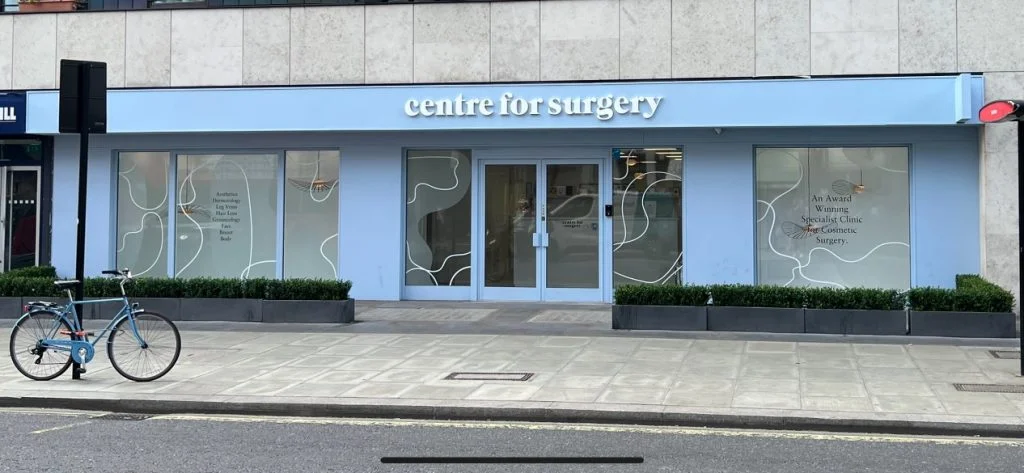Table of Contents

Achieving Your Optimal Weight Prior to Cosmetic Surgery
There are several strategies you can employ to shed those extra pounds before surgery and maintain a healthy weight post-procedure. Being overweight or obese can elevate the risk of complications linked to surgery, such as compromised wound healing, increased rates of infection, and postoperative blood clots. By losing weight before your plastic surgery, you can mitigate these risks and enhance your aesthetic outcomes.
RELATED: Ideal Weight For Tummy Tuck
A balanced diet coupled with regular exercise can be pivotal in your weight loss journey. Additionally, weight-loss medications and bariatric surgery may be viable options to help you achieve a healthier weight before any surgical procedure, including plastic or cosmetic surgery.
Centre for Surgery, situated in London, is a clinic specialising in plastic surgery. Our UK surgeons have assisted thousands of patients in safely sculpting and contouring various body parts after significant weight loss or post-pregnancy.
The Necessity of Weight Loss Prior to Cosmetic Surgery
Patients who have a high body mass index (BMI) are often advised to lose weight before undergoing surgical procedures. Carrying extra weight or being obese escalates the risk of experiencing complications in relation to surgery.
Being overweight or obese can augment the chances of several health complications, including:
- Hypertension (elevated blood pressure)
- Coronary heart disease
- Type II diabetes
- Stroke
- Various types of cancer (for instance: endometrial, liver, and kidney cancer)
Moreover, possessing a high BMI at the time of your surgery can:
- Extend the duration of your surgery
- Heighten the risk of wound healing complications
- Increase the likelihood of postoperative infections
- Raise the risk of developing blood clots
Furthermore, cosmetic surgeries such as abdominoplasty, liposuction or lower body lift surgery are designed to eliminate surplus skin and fat from different regions of your body, thereby reshaping and sculpting your physique.
Hence, weight loss is a crucial aspect before body contouring surgeries. It allows your plastic surgeon to extract as much extra fat and skin as feasible. Consequently, the nearer you are to your ideal weight, the greater the chances of achieving the optimal aesthetic results from your cosmetic surgery.
RELATED: How is The Face and Neck Affected by Significant Weight Loss?
Methods to Shed Weight Prior to Surgery
Shedding a considerable amount of weight can indeed be a daunting task, particularly if your starting point is a high body mass index.
There exist numerous efficient methods that can assist you in safely losing weight before plastic surgery. The journey towards an ideal body weight invariably commences with a strategy that is universally recognised – dietary changes.
Dietary Alterations
Implementing a low-calorie diet is an effective strategy to commence weight reduction in a healthy manner prior to procedures like abdominoplasty or a mummy makeover. The key to lowering your caloric intake revolves around focusing on consuming:
- An abundance of vegetables
- Various fruits
- Foods rich in lean proteins
Concurrently, it’s vital to limit your consumption of foods that are high in:
- Added sugars
- Elevated levels of salt
- Refined carbohydrates
- Saturated fats
A balanced diet generally encompasses:
- A wide array of vegetables, fruits, and whole grains
- Fat-free or low-fat dairy products
- Sources of lean proteins such as fish, peas, beans, lean meats, nuts, and seeds
- Foods with low levels of added sugar and sodium
Embracing a healthy diet is all about achieving balance. You should still be able to enjoy your favourite foods, albeit in smaller servings. Adhering to a balanced diet even after your surgery can assist in keeping the weight off and preserving your aesthetic results.
Exercise
Incorporating regular physical activity is another method to shed weight and sustain weight loss before procedures like a thigh lift or breast reduction surgery.
Pairing a balanced diet with consistent exercise can enhance overall health, decrease the risk of severe diseases, and improve the results of cosmetic surgery.
Begin with moderate-intensity exercise and gradually transition to more vigorous physical activities.
Examples of moderate-intensity activities include:
- Brisk walking
- Light cycling
- Dancing
- Recreational swimming
Examples of vigorous-intensity activities include:
- Running
- High-speed cycling
- Hiking
- Competitive sports (e.g., tennis, football)
Weight Loss Medication
Sometimes, despite diligent exercise and dieting, you may not achieve the desired weight loss before your body contouring surgery. In such instances, your doctor may prescribe weight loss medication or pills to assist you in shedding weight and maintaining it prior to procedures like liposuction or abdominoplasty.
Most weight loss medications function by reducing your appetite, increasing your feelings of satiety, or both.
You might be prescribed weight-loss medication if:
- Your Body Mass Index (BMI) is greater than 30
- Your BMI is greater than 28, and you have a serious health condition associated with obesity such as high cholesterol, high blood pressure, or diabetes.
Generally, weight-loss pills or injections are not recommended if you’re pregnant, breastfeeding, or planning to become pregnant.
Research indicates that when weight-loss medication is combined with a healthy diet and regular exercise, you could lose up to an additional 10% of your total body weight.
Weight loss surgery
Bariatric surgery, an area of medical practice dedicated to facilitating weight loss, often provides a valuable solution when more traditional weight reduction methods prove insufficient. Despite rigorous adherence to diet and exercise plans, some individuals remain significantly distanced from their weight goals. In these cases, bariatric surgery can bridge the gap, creating the necessary conditions to prepare for body reshaping surgeries.
The collective term ‘bariatric surgery’ encompasses several distinct procedures, each designed to target excessive body fat that resists removal through conventional means such as dietary modifications, exercise, and weight-loss medications. Below we elaborate on four primary types of weight loss surgery:
- Gastric Balloon: During this procedure, a saline-filled silicone balloon is inserted into the stomach. The presence of the balloon promotes a feeling of fullness, reducing the amount of food that can be comfortably consumed.
- Gastric Bypass: Commonly referred to as Roux-en-Y, this widely performed procedure significantly reduces the stomach’s capacity. The surgeon creates a small stomach pouch and connects it directly to the small intestines. Consequently, ingested food bypasses the majority of the stomach, going directly from the newly formed pouch into the small intestines. This procedure limits both quantity and absorption of food, thereby facilitating weight loss.
- Gastric Sleeve: This procedure involves removing approximately 80% of the stomach laparoscopically, effectively transforming the stomach into a tube-like structure. The reduced stomach volume restricts food intake significantly, promoting weight loss.
- Biliopancreatic Diversion with Duodenal Switch (BPD/DS): A more complex and less commonly performed surgery, BPD/DS comprises two steps. The initial step involves a sleeve gastrectomy to reduce stomach size. The subsequent step involves rerouting a large portion of the small intestine, creating two separate pathways and one common channel. The smaller of the pathways, through which the food travels, directly connects the duodenum (the first part of the small intestine) to the last part of the small intestine, bypassing the majority of the organ. The larger pathway carries bile and pancreatic juices. When the pathways meet at the common channel, food and digestive juices mix to enable nutrient absorption. This extensive rerouting decreases both food intake and nutrient absorption, promoting substantial weight loss.
Bariatric surgery serves a dual purpose – it reduces total body fat and lowers caloric intake. Following such a procedure, the body, in response to decreased calorie consumption, utilises stored fat for energy. The resulting weight loss paves the way for subsequent body-reshaping surgeries. Please note weight loss surgery is not offered at Centre for Surgery.
RELATED: Body Shaping Surgery after Massive Weight Loss
What is the best way to lose weight before Cosmetic Surgery?
The appropriate approach to weight loss before plastic surgery varies greatly between individuals, dependent on several factors such as:
- Body Mass Index (BMI)
- Individual response to diet, exercise, and medication
- Presence of any pre-existing health conditions
- Personal preferences for weight loss methods
If you’re already near your ideal weight but need to lose a few extra pounds, a balanced diet combined with regular exercise can be an ideal way to safely shed the surplus weight before your plastic or cosmetic surgery.
However, if traditional methods like diet and exercise don’t yield the desired results, weight loss medication or injections may be an effective alternative. These can assist you in losing weight and maintaining reduced weight in preparation for surgeries such as body lifts or abdominoplasty.
In situations where diet medication proves ineffective, bariatric surgery could be considered. This form of surgery is designed to facilitate weight loss, thereby assisting you in reaching a healthier body weight prior to undergoing plastic surgery.
Frequently Asked Questions Regarding Weight Loss Prior to Plastic Surgery
What are the implications of not losing weight before surgery?
Everyone doesn’t need to shed weight before undergoing surgery. However, those individuals with a high Body Mass Index (BMI) may be exposed to a higher risk of infections, slow recovery from wounds, and other potential surgical complications. Furthermore, being overweight or obese at the time of cosmetic surgery may lead to sub-optimal aesthetic outcomes. Nonetheless, if you are within a healthy weight range or are near your target weight, there is likely no need for further weight loss prior to your surgical procedure.
Is it more beneficial to lose weight before or after a tummy tuck?
An abdominoplasty, or tummy tuck, is not a surgical procedure intended for weight loss. Its primary objective is to sculpt and flatten your abdomen by removing surplus fat and skin, often following substantial weight loss. Thus, it is generally advisable to lose weight and be as close as possible to your ideal weight prior to undergoing a tummy tuck. In this way, your plastic surgeon will be capable of removing the maximum quantity of excess skin and fat. Furthermore, substantial weight loss following your abdominoplasty could result in sagging abdominal skin again, thereby negatively impacting the aesthetic results of your surgery. Consequently, losing any necessary weight before your abdominoplasty and maintaining a healthy weight post-surgery is recommended.
Is it necessary to lose weight before a mummy makeover?
It is always beneficial to be at a healthy weight before any kind of surgery, particularly cosmetic surgery. A mummy makeover targets various areas of the body (such as the abdomen and breasts) affected by weight gain, often following childbirth. Being close to your desired weight before undergoing a mummy makeover will assist your surgeon in more efficiently and effectively reshaping and sculpting different parts of your body.
Why choose Centre for Surgery?
Centre for Surgery is a leading UK plastic surgery clinic, specialising in a wide range of procedures for men and women. We are dedicated to providing the highest standard of care to ensure the best outcomes for our patients. Here are some reasons to choose us:
- Expertise: Our surgeons are highly skilled and experienced in their respective fields, ensuring you receive top-quality care.
- Personalised Care: We understand that each patient is unique, and we provide individualised care to meet your specific needs.
- Advanced Techniques: We utilise the latest surgical techniques and technology to achieve optimal results with minimal downtime.
- Safety: Your safety is our top priority. We maintain the highest standards of clinical governance to ensure your well-being throughout your journey.
- Transparent Pricing: We believe in clear and transparent pricing without any hidden costs.
- Postoperative Care: We offer comprehensive aftercare to monitor your recovery and ensure you achieve the best possible results.
Choosing Centre for Surgery means entrusting your care to a team that is committed to your health, safety, and satisfaction.









